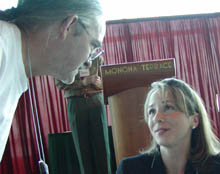Jail time for reporters who protect sources is a matter of "judicial roulette"
All journalists like to brag that they would go to jail to protect their sources. Vanessa Leggett actually did, for 168 days, and much of the case turned on whether she was a “real” journalist.
She regaled attendees at the sold-out AAN First Amendment Luncheon Thursday with tales of her struggle with the cops and the courts over her notes and her time in jail.
“I didn’t learn about journalism in the traditional way,” said Leggett. “You could say I learned about it the same way an adolescent boy learns about sex — groping and fumbling my way through, getting rejected and slapped occasionally.”
Leggett is a lecturer in English and criminology by trade, and her published work tends toward the scholarly. “I don’t have any affiliation with a news organization, big or small,” she says.
That didn’t keep her from compiling an impressive set of interviews surrounding the slaying of Houston socialite Doris Angleton in 1997. Among her interviews was one with the brother of Angleton’s husband. In it, Leggett says the man confessed to the murder and implicated his brother, whom Leggett describes as a bookie to Houston blue bloods.
“It was clear to me when he dropped that bombshell that the police would be interested in my tapes because I was holding evidence.” When the police got wind of her tapes and notes, they were understandably interested. When the feds got wind, they pressured her to become a confidential informant.
“When they asked me to do this, I didn’t say, ‘this is an assault on the First Amendment, there is no way I will do this.’ I just said I wanted to think about it.” When she refused, they subpoenaed her before a grand jury and told her to surrender all of her records of the case. She wouldn’t.
When she tried to invoke journalist’s privilege, a federal judge ruled that her scant publication history and lack of formal affiliation with a news organization precluded her from doing so. The judge then found her in civil contempt and sent her to the federal detention center in Houston.
Leggett stayed in jail for 168 days until the grand jury terminated in January of this year, and she was begrudgingly let go.
“The press is supposed to act as a watchdog on government,” she said. “If the government is deciding who is a journalist and who is not, who’s gong to monitor the government”
Financial and moral support from the Society of Professional Journalists and the Houston Chronicle after her incarceration “gave me the stamina I needed to put up a fight.”
She singled out Michael Ventura of the Austin Chronicle, who wrote about her case while she was in jail, and spat at “the local weekly,” for “essentially calling me a dumb bitch,” who had no right to claim she was a journalist. Later, she took some of that back saying her message to that “local weekly” was “thank you” for being a staunch defender of the First Amendment.
Leggett had about five months, including Sept. 11, Thanksgiving, Christmas and New Year’s to reflect on her experience and what it means for the First Amendment.
“It’s not the institution of journalism that needs to be protected, it’s the act of journalism,” she said. “We must always work to ensure the free flow of information to the public. When the government gets involved, that can’t occur.”
She appreciates the attention her case has gotten, but she said the fight is far from over.
“Different federal circuits interpret [journalistic privilege] differently, and it’s a matter of judicial roulette as to whether you will go to jail if you try to protect your sources.”
Matt Olson is a freelance writer based in Madison, Wis.








